- How Much Weight Can You Realistically Lose in 3 Months? - January 14, 2024
- How To Lose 1kg a Week (Guaranteed) - August 20, 2023
- How To Count Calories (or Estimate) and Stay on Track When Eating Out at Restaurants - July 25, 2023
Quick Answer:
For the vast majority of people, counting calories is more than sufficient for weight loss. Macros may be useful to count if you’re a top-level athlete or trying to get very lean, but for the layperson, counting macros is overkill
Intro
‘What’s your macro split bro?’
‘What’s your Carb to Fat Ratio’
‘How many gs of fibre are you eating a day’
You’ve probably heard all of these before, and the fact is, if you’re just trying to lose some weight, none of it matters.
I bet that’s a weight off your shoulders.
Yep, no need to worry about macros anymore, just focus on calories.
No need to debate whether 40% or 45% of your diet coming from carbs is superior.
You don’t believe me though do you…
Well let me explain.
Macros VS Calories: The Differences
What are Calories?
A calorie is a measure of energy.
If you take in more energy than your body needs, that energy will be stored as fat for your body to use later (unless you don’t use it, then it’ll just stay there as fat).
If you take in less energy than your body needs to function, your body will tap into body fat stores to get that energy, meaning you’ll lose weight. This is also referred to as a calorie deficit.
So, if you pay attention to the number of calories you’re eating on a daily basis (as well as tracking your body weight and your activity), you’ll be much more likely to lose weight consistently, and sustainably.
Calories in VS Calories out WILL dictate whether or not you gain or lose weight. Not Keto, not Intermittent Fasting, and not cutting out Carbs; all those things are tactics, but the underlying principle is that you NEED to take in fewer calories than you’re using.
What Are Macros?
Macronutrients are the components that ‘make up’ calories.
There are three main macronutrients; Protein, Carbohydrates and Fat.
As this study states, “Each of the macronutrients, carbohydrate, protein and fat, has a unique set of properties that influence health, but all are a source of energy”
Protein
Protein is made up of amino acids, which are the building blocks of muscle. Protein is important for maintaining and building muscle tissue as well as other tissues like hair and nails. Typical protein sources include;
- Red meat 🥩
- Poultry 🍗
- Fish 🐟
- Diary 🥛
Carbohydrates
Carbohydrates give us the energy to move around, that means fidgeting, walking, running, weightlifting or playing sport. Typical carb sources include;
- Bread 🍞
- Rice 🍚
- Pasta 🍝
- Cereal 🥣
Fat
Fat helps the body absorb micronutrients, and is important for hormone function. Typical fat sources include;
- Cheese 🧀
- Nuts 🥜
- Oil
- Butter 🧈
- Chocolate 🍫
It is important to note that almost every food will contain at least two macronutrients to some degree. Milk is a great example of a food that contains a relatively even split of all three macronutrients.
There are some exceptions though.
White fish and prawns/shrimp are almost exclusively protein
Most oils are pretty much 100% fat.
And candy like Haribo is pretty much all carbs.
Different macros contain different calorie amounts, so;
| Macro | Calories per g |
| Protein | 4 |
| Carbs | 4 |
| Fat | 9 |
This means that a gram of fat, has over twice the amount of calories as a gram of protein or a gram of carbs.
So, the less fat you have in your diet, the lower your calories will be.
Why The Focus on Macros?
This is controversial but my personal opinion is that the importance of macros have been overstated by coaches and personal trainers to make their products and services seem more complicated, which justifies them being able to charge more.
If people are confronted with complex but legitimate sounding concepts like ‘ideal macro splits’ they’ll be more inclined to think that coaches that emphasize this are more intelligent and have the ‘perfect answer’ to solve their weight loss issues.
But the fact is, for most people, macros don’t actually matter for weight loss, and focusing on the calories will make the whole process more simple to navigate.
So, Should You Count Macros?
Whether you realise it or not, every meal you eat will be made of a certain percentage of these different nutrients.
It could be 30% protein, 40% carbs, and 40% fat.
Or 42% protein, 37% and 21% fat.
Most meals will generally contain a mixture of all three of these macronutrients to some degree.
There are certain meals that could be low in protein, like Mac and Cheese, or low in fat, like grilled white Fish with rice and Veg.
So, you are on a ‘macro split’ by default.
Now, some people argue that there there is ‘an ideal’ macro split for dieting and losing weight but this simply isn’t the case, because it is NOT the macro split that will determine whether you lose or gain weight, but the total calorie amount.
Let me explain.
Someone may have told you that a 30P/40C/30F Macro Split is optimal.
Great, you plan your diet around that.
Let’s say your total daily energy expenditure is 2,000 calories a day;
Diet example 1: 2,000 calories per day
| Macro | Split % | Grams | Calories |
| Protein | 30% | 150 | 600 |
| Carbs | 40% | 200 | 800 |
| Fat | 30% | 66 | 600 |
Diet example 2: 1,500 calories per day
| Macro | Split % | Grams | Calories |
| Protein | 30% | 113 | 450 |
| Carbs | 40% | 150 | 600 |
| Fat | 30% | 50 | 450 |
Let’s do a quick quiz.
Both diets have the exact same ‘ideal’ macro split, but will both result in weight loss?
The answer is no, of course, they won’t.
Diet 1 will mean they just maintain their weight because they’re eating the exact number of calories they need per day to survive.
Diet 2 will in theory work because it’s creating a daily deficit of 500 calories, which should result in about 1lb or 0.5kg of weight loss per week.
So the macro split here is irrelevant, it’s the calories that dictate whether the diet will be successful or not.
This is proof that your macro split is largely irrelevant when it comes to weight loss, so no, you DO NOT need to count macros, as long as you are tracking calories.
Ignore Macro Splits
The above demonstrates that there is no ‘ideal’ macro split for weight loss. As long as calories are accounted for, any macro split can work.
The Case For Counting Macros
But are there any situations where you should count Macros?
Well, if you really enjoy counting Macros, and it works for you, then fill your boots but it really does overcomplicate things.
As shown in the example above, if you want to count Macros and lose weight successfully, you’ll first need to know how many calories you need to eat, and reverse engineer how many grams of each Macro you need.
Pssst this is OVERKILL and probably a massive waste of your time.
There is one situation where I think counting Macros could be beneficial though, and that’s for people that don’t eat enough protein.
You see, protein is unique in that it does some cool things;
- It helps maintain and build muscle
- It helps keeps you feeling full, which is obviously very useful when you’re dieting
- Digesting protein actually burns significantly more calories than digesting carbs or fats, so you don’t absorb as many calories from protein as you do from the other macronutrients
The last one is very handy if you’re trying to lose weight.
This study on diet induced thermogensis showed how much of each macronutrient is actually burned during the digestion process. As you can see, protein wins by a long way.
| Macro | % Of Calories Burned During Digestion |
| Protein | 25% |
| Carbs | 7.5% |
| Fat | 1.5% |
This means that if you eat 100 calories of protein, only 75 are actually absorbed.
Because of this, (alongside the other benefits) as a blanket recommendation I think everyone should be eating a protein serving with each meal.
For example, this could be Yogurt with breakfast, chicken with lunch and red meat with dinner.
This is quite easy to do, BUT if you find you can’t stick to it may be useful to implement a protein goal.
This is what a day in the life of a typical low-protein consumer on 1,500 calories a day might look like;
| Macro | Split % | Grams | Calories |
| Protein | 13% | 48 | 192 |
| Carbs | 54% | 204 | 816 |
| Fat | 33% | 55 | 495 |
But how many of those calories are burned during digestion?
| Macro | Calories Consumed | Calories Burned Through Digestion | Total Calorie Intake |
| Protein | 192 | 48 | 144 |
| Carbs | 816 | 61 | 795 |
| Fat | 495 | 7 | 488 |
So, of the 1,500 calories consumed, only 1,386 are absorbed.
Awesome.
But what if we crank up that protein? If we do that, the same 1,500 calorie diet could look like this;
| Macro | Split % | Grams | Calories |
| Protein | 43% | 160 | 640 |
| Carbs | 39% | 148 | 592 |
| Fat | 18% | 30 | 270 |
A much higher split of protein, so how does that help us out?
| Macro | Calories Consumed | Calories Burned Through Digestion | Total Calorie Intake |
| Protein | 640 | 160 | 480 |
| Carbs | 592 | 44 | 548 |
| Fat | 270 | 4 | 266 |
In this scenario, we only absorb 1,294 calories, so by upping the protein, we are saving ourselves 92 calories.
Doesn’t sound like much, but that’s 644 calories a week, or 2,576 calories a month.
And that’s enough to make an impact.
So THAT is the value of tracking macros, particularly tracking protein.
The caveat is that a 43% protein diet is quite high, and likely tricky for most people to maintain in the long term.
So, you’ll still get the most ‘bang for your buck’ just by tracking calories, but if you need that little extra boost, tracking macros (well protein) can give you a helping hand
Pros of Tracking Macros
- Allows for increased accountability if eating more of a particular macronutrient (e.g. protein)
- Good for athletes, sports people or bodybuilders that need to drop the final few pounds
Cons of Tracking Macros
- More time-consuming than just tracking calories
- Much closer attention needs to be paid to food choices in order to stay within prescribed macro targets
The Case for Counting Calories
I don’t really need to make a case for counting calories.
ALL my clients have an do still count calories ONLY, and all of them are seeing success
Here are a few examples of their real results;
Example 1: Male, 38, 13lbs (6kg) lost in 4.5 months
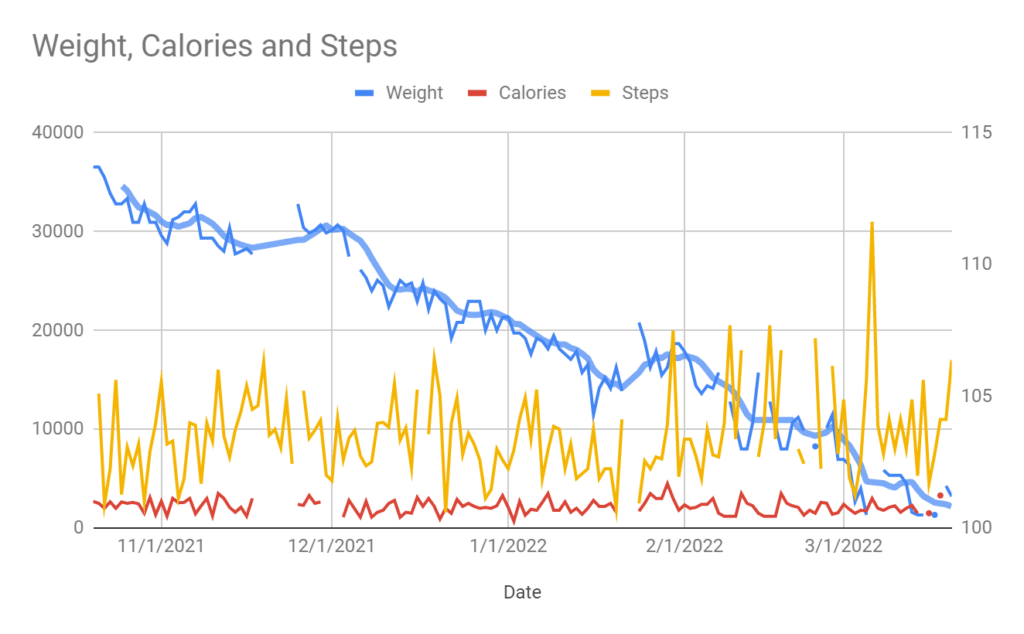
Example 2: Female, 31, 6lbs (3kg) lost in 2 months
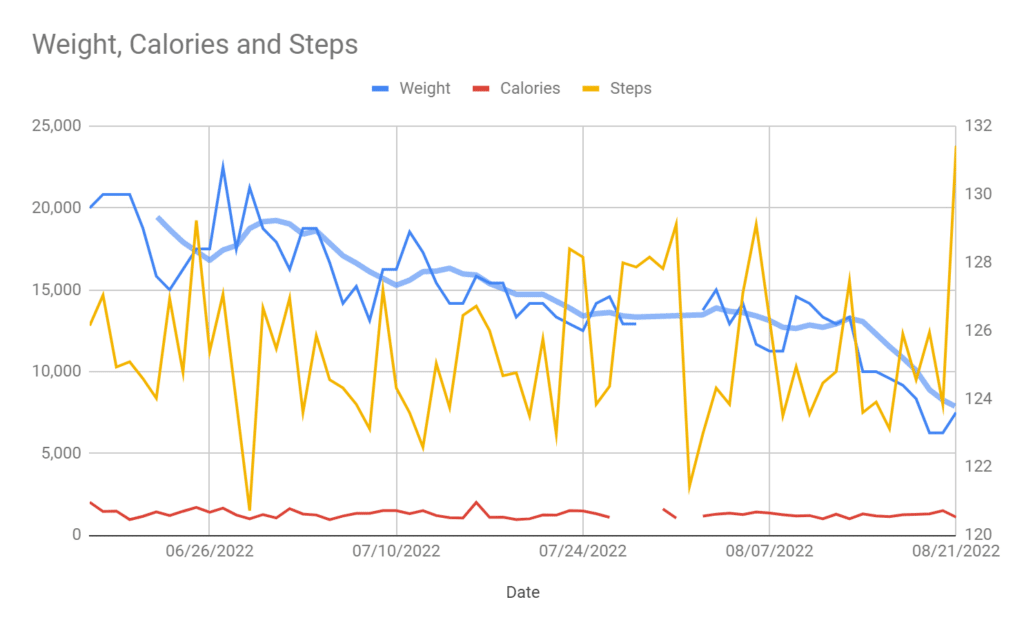
Example 3: Male, 34, 24lbs (11kg) lost in 7 months

I really do believe this should be the default approach for everyone looking to diet, especially people that are new to dieting.
NO, counting calories is NOT obsessive or unhealthy as long as you do it in the right way.
Whether we like it or not, everything we consume contains calories, so rather than turning a blind eye to it, the best approach is to count calories to get an understanding of how much energy is in various different foods.
You DON’T have to count calories forever.
Once you’ve done it for 6-12 months, you’ll have a good understanding of calories and should be able to transition into eating semi-intuitively, but you need to put the groundwork in to get that baseline appreciation.
Pros of Calorie Counting
- Provides a true insight into the energy content of the food you’re eating
- Allows total flexibility with your food choices; no need to stick to a rigid meal plan ‘eat clean’ or avoid carbs
- Will educate you about food and energy content, meaning even if you stop tracking calories, you’ll be able to make accurate estimates about the calorie content of food you don’t track
Cons of Calorie Counting
- Can initially be time consuming
- Requires constant access to a phone/calorie tracking app
- Can lead to an ‘IIFYM’ mentality whereby food quality is deprioritized in favour of high sugar, high fat, and processed foods providing they fall into calorie (or macro targets)
A 3rd Option: Intuitive Eating
If you don’t want to count calories OR macros, then it is still possible to lose or maintain weight by practicing intuitive eating.
Intuitive eating is a method that relies on judging your own hunger signals to make decisions about what to eat, how much to eat, and when to eat.
For example, if you normally art breakfast, but aren’t hungry at breakfast time, you might eat less than you normally would, or skip breakfast altogether.
The Intuitive eating framework has ten rules, but the overarching theme is that you autoregulate your behavior to suit the situation.
While I agree with this approach and have been using it successfully myself for over five years now, this NOT the best approach for people that have not counted calories before.
Why?
Because people that are struggling to lose weight are likely eating intuitively anyway, i.e. eating when they’re hungry.
The problem is, they have no idea what to eat, or how much of it they need to satisfy their hunger, they often grossly overestimate the amount of food they need, and overconsume calories to the point that makes losing weight an impossibility.
If this sounds like you, you need to go through a period of calorie counting (6-12 months) before you can start eating intuitively.
If you don’t go through this process, you won’t know that;
- A drizzle of cooking oil can contain over 100 calories
- A few handfuls of nuts might be a healthy snack, but they can contain hundreds of calories
- Avocados contain more calories than almost any other vegetable
So for me, intuitive eating is not an alternative to calorie or macro tracking, but rather a methodology to transition into after you’ve been using calorie tracking to successfully lose weight for a significant period of time.
Beginners Can’t Eat Intuitively
To slam the point home, your chances of losing weight by eating intuitively are almost zero. In order to be successful with this approach, you need some calorie tracking experience under your belt. If you don’t you won’t intuitively know roughly how many calories you’re eating, or what foods you can use to make you feel fuller without overconsuming calories
What if You’re Trying to Build Muscle?
If you’re trying to build muscle, but you don’t care how much fat you gain, then go wild, just ensure you eat enough to make sure the scale is going up consistently.
Most people WILL care about minimizing fat gain though, so in this case, you WILL need to pay attention to your calories.
Given that most experienced trainers can only realistically build a 1-3kg (2-7lbs) of muscle per year, a very small calorie surplus is required to facilitate muscle building, in fact a surplus of 50 calories is probably all most people will need to maximize muscle growth.
This means, if your total daily energy expenditure is 2,000 calories per day, you’ll only need 2,050 calories a day.
In order to achieve this level of accuracy, you WILL need to track your calories.
You will also need to ensure you’re getting enough protein.
There’s a lot of debate in the scientific literature about exactly how much protein you should eat, but this study recommends getting between 1.6g per kg and 2.2g per kg per day.
This means that if you weigh 80kg (176lbs), you should be getting between 128g and 176g of protein per day.
This means that if muscle gain is the goal, you’ll need to track both calories AND protein.
Should you Count Calories or Carbs?
Regardless of whether weight loss or muscle gain is the goal, counting carbs is largely unnecessary.
For me, as long as calories are accounted for (and protein if you’re trying to gain muscle), then you can freestyle your carbs and fats.
Eating to a specific carbohydrate or fat target isn’t really going to benefit you, unless your carb or fat intake is really low as a rule.
So no, no need to count carbs.
Summary
While having fixed macro targets, and tracking them diligently will result in weight loss (provided it creates a calorie deficit), tracking calories alone is far easier, quicker and achieves the same end goal.
This study on different macronutrient compositions agrees, stating “reduced-calorie diets result in clinically meaningful weight loss regardless of which macronutrients they emphasize.”
All my clients track calories only, and all have achieved positive results. For the average person, macro tracking just isn’t necessary.
References:
Calories: https://www.ncbi.nlm.nih.gov/books/NBK499909/
The macronutrients, appetite and energy intake: https://www.ncbi.nlm.nih.gov/pmc/articles/PMC4960974/
Diet-induced thermogenesis: https://www.ncbi.nlm.nih.gov/pmc/articles/PMC524030/
Comparison of Weight-Loss Diets with Different Compositions of Fat, Protein, and Carbohydrates: https://www.ncbi.nlm.nih.gov/pmc/articles/PMC2763382/
Recent Perspectives Regarding the Role of Dietary Protein for the Promotion of Muscle Hypertrophy with Resistance Exercise Training: https://www.ncbi.nlm.nih.gov/pmc/articles/PMC5852756/
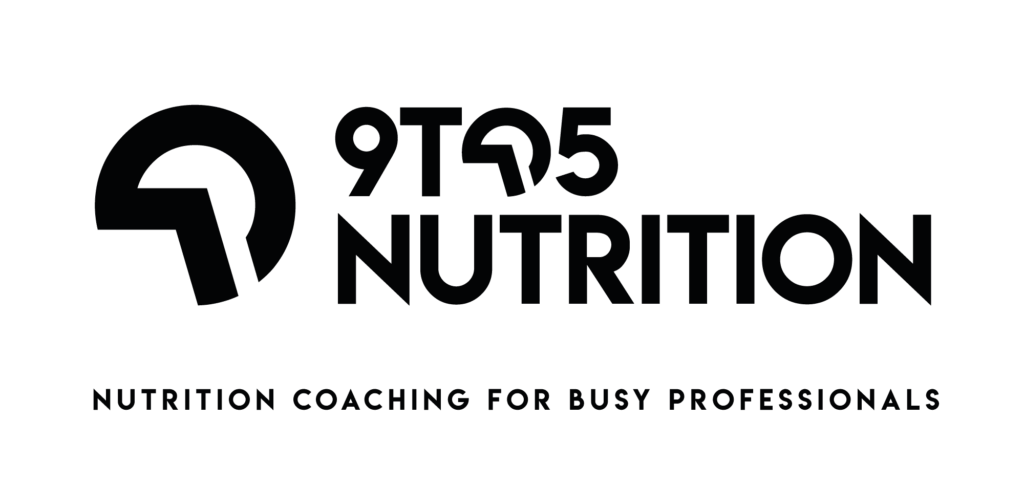
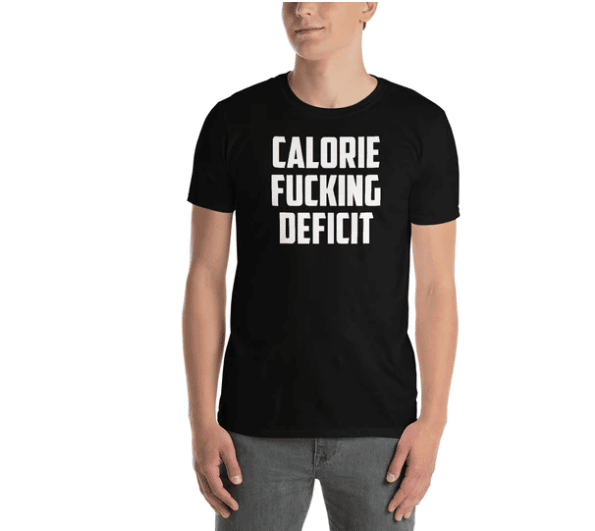
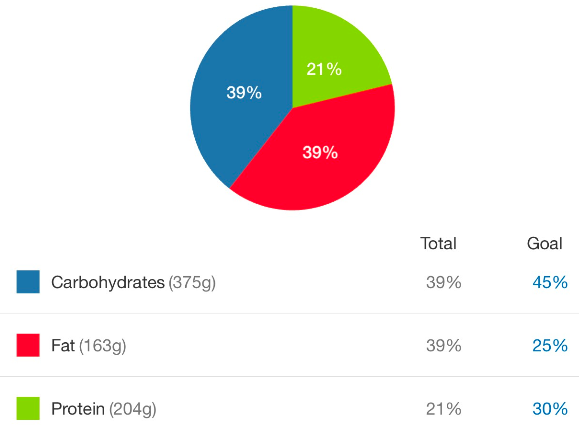
Leave a Reply